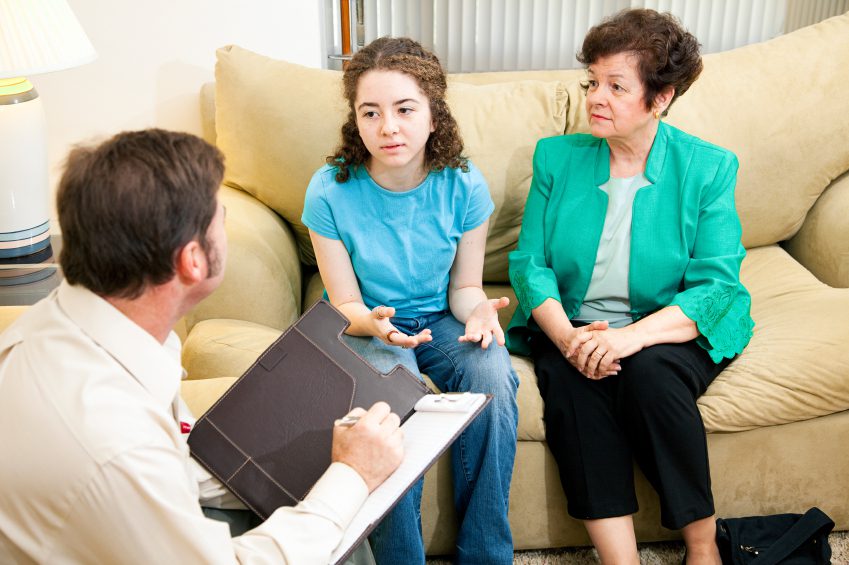9 Ways to Know If Your Child’s Mental Health Clinician Is Right for Them

Posted in: Grade School, Parenting Concerns, Teenagers, You & Your Family
Topics: Mental Illness + Psychiatric Disorders
As parents, we all want the very best for our kids – the best teachers, coaches, and health professionals, among others.
About one in five of our children, teenagers, and young adults will experience a mental health issue and ideally receive mental health care. I say “ideally” because there is a huge shortage of mental health professionals, and the barrier of stigma makes some parents reluctant to seek care. Navigating the healthcare and insurance industry to access services is a nightmare for many. But after searching and waiting, many find a clinician to see their child.
Then comes an even more complicated question: Is the clinician you’ve found right for your child?
Therapy poses unique challenges for parents. There are few situations in a parent’s life where your child meets with another adult for guidance and care without you being present. Placing your child’s emotional health in someone else’s hands can be scary. Furthermore, direct and personal contact with your child’s provider is limited. It’s one thing to personally see a therapist over time and really get to know them. It’s another to have only occasional contact and need to rely on your child’s report, and hopefully progress.
In addition to wanting a mental health clinician to be professional, likeable, trustworthy, and available, we want them to have expertise in the disorders they are treating and use the most current evidence-based therapies. We also want them to be a good fit for our child or teen.
Given the need for confidentiality between the mental health clinician and your child, how do you know the clinician is a good choice? Here are some questions to consider in feeling reassured your child is getting high-quality mental health care.
1. Meeting Your Clinician: What Is Their Communication Style?
Every competent child mental health clinician should perform a comprehensive evaluation and meet with parents, caregivers, and important family members. While this is your first encounter, you can get a sense of who this person is and how they function by thinking about some of the questions below.
- Do they listen to your narrative?
- Do they ask detailed questions about your child and family history?
- Do they involve your child in history-gathering? Do they seek additional observations about your child, such as from your pediatrician, teacher, or others?
- Are they respectful, non-judgmental, and open to your observations? After all, you’re the expert about your child and changes in their behavior.
- Are they empathic?
- Do they ask about your sense of what is going on, and your concerns?
- Do they offer a thorough assessment of what they think needs clinical attention and lay out the possibilities for treatment?
- When a treatment is agreed upon, do they educate you and your child about the risks, benefits, and how it shall be conducted?
- Do you like their manner, approach, and way of talking with you and your child?
2. How Does Your Child Like the Clinician?
Let’s face it: most kids and teenagers wouldn’t choose therapy, but like most things in their lives, they abide by what is required. Despite the strain of therapy on an already-booked schedule, often with activities that are more fun, you should ask your child how they like their therapist. Sometimes it’s hard to tell at first. Your child may feel like a hostage being “forced” to go to therapy, and it’s tough to sort out how much is hating the requirement to go and how much is disliking the person they’re seeing.
While asking about how they like their therapist, be careful around asking what they talk about, as you don’t want to invade a confidential space that is unique in therapy. The therapist’s ability to form a sound attachment to your child, grounded in trust and respect, is really important. Therapy should be a special, private space in which the child can open up, be themselves, and face their challenges in life – even about difficulties with you, if needed.
3. How Available Is Your Child’s Clinician?
While boundaries are important in therapy, a clinician treating a child, teenager, or young adult needs to be accessible. The digital age is here and is a mainstay for our kids. Most clinicians who see kids use texting, email and other digital ways of connecting, as appropriate. As a parent, you should also be able to connect with your clinician on short order. Things move fast for most of our kids, and your ability to ask questions, send school reports, or provide updates about home events is essential. Many clinicians are quick to respond to the child and the parent. For adults, waiting till the next session to discuss things may be fine; for young people, a brief and immediate response may be essential.
4. Do They Welcome Mutual Feedback?
Kids and parents want ongoing feedback about the quality and course of treatment. It’s valuable for a clinician to offer this at regular intervals, or as often as desired by the parent or child. Clinicians should work with the family to set emotional and behavioral goals early in treatment. These goals may involve a specific type of therapy, medication management, or other mode of care, but targeting symptoms and agreeing on which tasks are assigned to the clinician and the patient or parents is an important part of good therapy. As treatment continues, this makes it easier for seeking, giving, and getting feedback to take place – both positive and critical. This is incredibly useful since emotional and behavioral changes need to be observed, and if not for the better, a change in course is required. One trait of a great therapist is the ability to apologize for misunderstandings or mistakes. No one gets it right all the time, particularly with young people, and any therapist who can admit missing the boat is a great sign.
5. Do They Help You Better Understand Child Development and Treatment?
For parents, there can be many questions around typical child and teen development, and even more about psychiatric disorders and their treatment. Online content, except for limited trusted sites, is filled with misinformation. All therapists should explain to parents what is considered a typical developmental milestone, a phase, or an indicator of illness. Parents across the board want to know what to look for, when to worry, and what to do next. Common questions include: what is play therapy? What kind of psychotherapy are you using? Why consider medications and what are the risks, potential benefits, and possible side effects? Education around these issues is not simply reassurance; it is pivotal to understanding the nature of a child’s challenges and options for successful treatment.
6. Are They Willing to Be Flexible to Modify Treatment?
Positive changes in mood, anxiety, thinking and behaving are often imprecise and slow going. If things aren’t progressing, a good clinician needs to take stock with you and your child about reviewing the treatment model and considering modifications. While behavioral change is often slow, it should be evident to everyone over time. Clinicians need to be open to reviewing their model, discussing how things are going with the child and parent, and not be defensive or rigid in their way of doing things. When things don’t seem to be going well, their seeking help from a consultant is another positive sign.
7. Do They Collaborate With Other Professionals?
Young people of all ages do not live in a vacuum and have regular contact with many adults in their lives. In the case of mental healthcare, this would be a team of professionals. The best clinicians make a point to form a treatment model that includes teachers, primary care clinicians, other specialized mental health professionals, and tutors. In some cases, nutritionists, speech and language specialists, and medical specialists are also involved in treatment. Regular communication that integrates each member of the team into a comprehensive plan vastly helps the care of youngsters. We know from research that there are often differences between child, parent, and teacher reports of behavior. Thus, a good therapist will want to know the level of consistency (or lack of consistency) in a child’s behavior in different environments. This may inform all on the team of the settings and triggers in which problems arise or are exacerbated.
8. Is There Interest In Your Child’s Family?
The best care involves all parts of a child’s or teen’s life. First and foremost is family. Family therapy may well be an element of the care and, at times, be provided by a separate therapist. Regardless of this, a good therapist for your child will often want to meet with the whole family or with the child and another family member, as part of the child’s independent therapy. Working to resolve interpersonal conflicts and foster positive attachments is a vital role for any good therapist.
9. Are They Culturally Aware?
Every culture has its own values, beliefs, and traditions. Views about mental illness are no exception. A good therapist cannot adequately care for a child if they don’t pay close attention to the family’s understanding of psychiatric disorders and their treatment. Most good therapists have been trained in the appreciation of a cultural norms. Even so, there are so many variations from one culture to the next. It’s a great sign if your therapist asks you to tell them about your cultural values and beliefs about mental illness and its treatment.
Remember that no therapist is perfect. When you find someone who meets most of these signs, and you feel comfortable and confident that this is a person you trust, and whom you can rely on to seek the best interests of your child, you can relax and be confident the clinician is right for your child.

 Share
Share Tweet
Tweet





